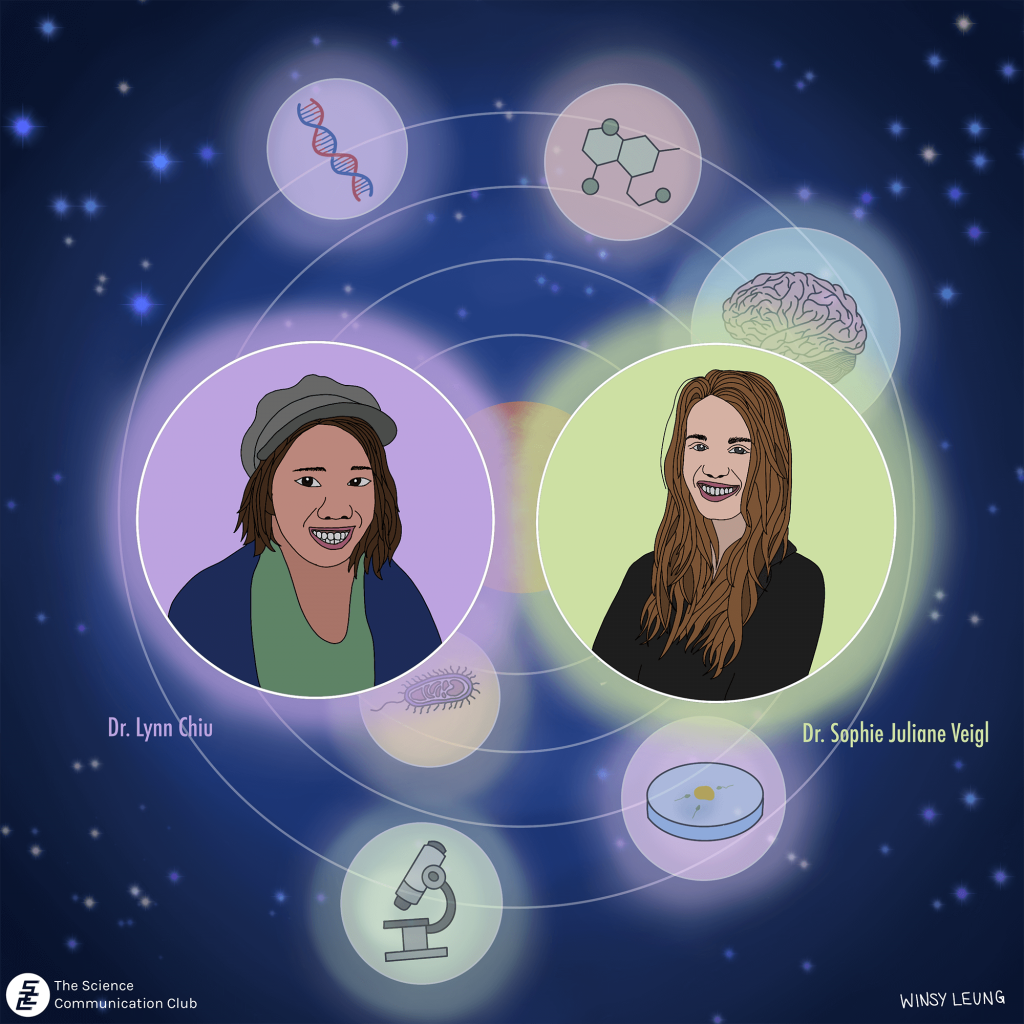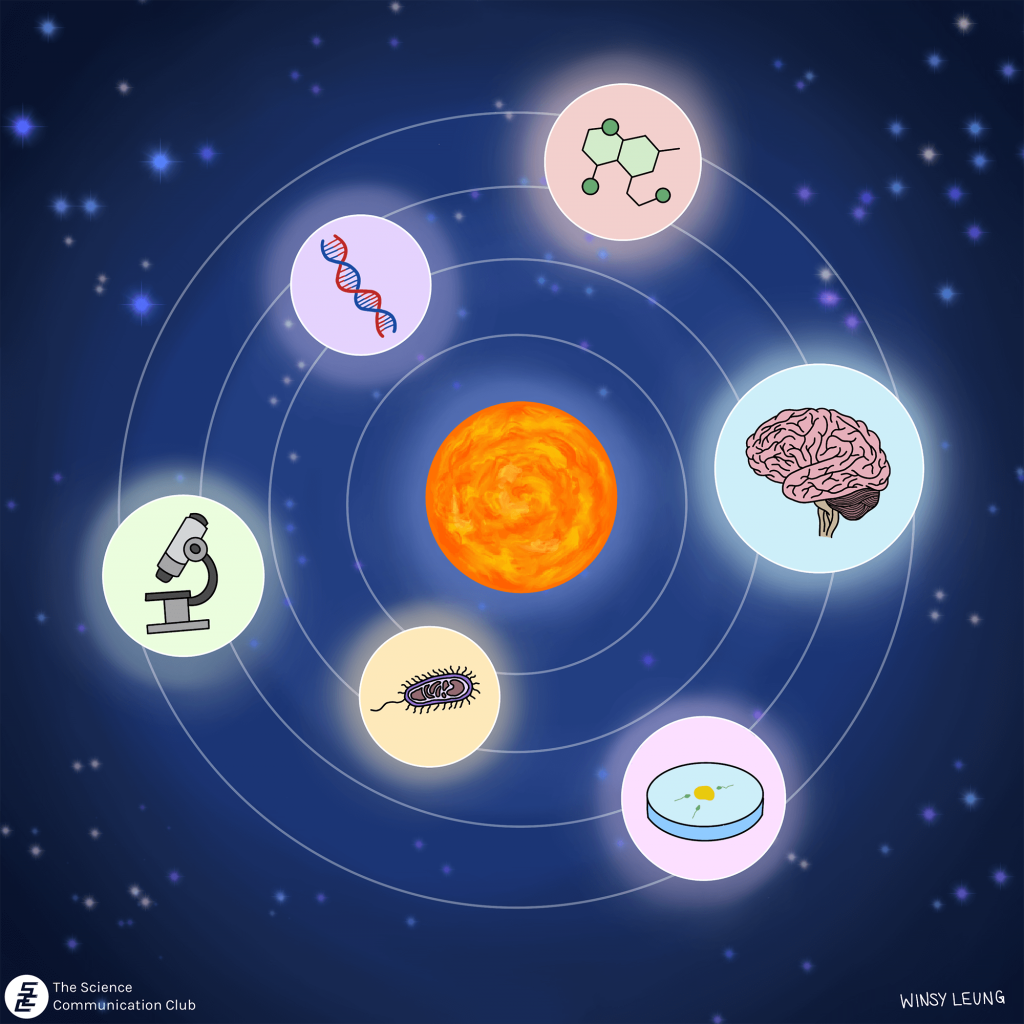
Written by Syed Hussain Ather
Illustrated by Winsy Leung
Though we don’t often see philosophy popping up so frequently in the media, studying science communication through a philosophical lens can reveal more than meets the eye. When it comes to the best ways to write about science for larger audiences, we find ourselves exploring issues related to rules, principles, and roles played by scientists in various disciplines as they can be communicated and portrayed through the media. Raising the deepest of questions such as the scientific terms we use to describe phenomena we observe (like using “H2O” as a name for water) or the ethics of covering science projects in a way that portrays them fully and accurately (like the failures of simulating the human brain on supercomputers in the documentary In Silico). In light of these issues, the philosophy of science communication has emerged as a newly minted field in which we can seek to answer these questions.
In this interview, we speak with Dr. Sophie Juliane Veigl in the department of science in historical, philosophical, and cultural contexts at the University of Vienna, as well as Dr. Lynn Chiu, a philosopher of biology also based in Vienna, on how the philosophy of science communication can enhance the work of scientists, philosophers, and science communicators alike. In this exciting new discipline, researchers in the philosophy of science communication have been seeking to address the roles played in philosophical areas that deal with ontological (on the relationships between concepts), epistemic (on our access to knowledge), normative (on how one might evaluate something such as a virtue), and sociological questions that professionals raise at the intersection of science, philosophy, and communication. Whether we’re commenting on the questions that arise when different disciplines interact with each other (such as philosophy and science) or the issues of communicating science to the general public (like the authority and appropriate ways of doing so), the philosophy is deeply interwoven into all areas of science communication.
How can science communicators use philosophy to improve their work? Do you believe there are specific ways that our science writing and methods of communicating science can improve through a deeper understanding of philosophy?
SV: I am not sure about philosophy in general, even though I do feel that a good reading of Engels, or Nietzsche has good chances of improving any type of work. Talking about the philosophy of science in particular, I think there are at least two ways. One is methodological: there are amazing examples of philosophy of science work making the “subject matter”—the science discussed—super accessible. One of my favourite examples is Hasok Chang in Is Water H2O? The other one concerns the philosophical inputs. Let me give an example: There is an amazing amount of work on intersectional, feminist philosophy of science. I definitely think that a profound awareness of the influence of certain categories, such as gender, sexual preference, race, social class, and ability on the sciences will undoubtedly improve one’s science communication.
LC: Science communicators already know that they are not just in the business of communicating scientific content, aka the findings of a particular scientific report. They are also in the business of conveying the inner workings of science, e.g. the people behind the science, the way a particular scientific field works, how society and policy impact scientific processes and outcomes. This is where the philosophy of science and science communication meet. Contemporary philosophy of science is concerned with multiple dimensions of the sciences, such as the logic and rationale of scientific theorizing, methods, and practices, the nature of scientific concepts and ontologies, as well as the ethics and the social-political aspects of science. Experts in the history, philosophy and social studies of science explicitly address these dimensions of science. Their analyses can thus complement and enrich the work of the science communicator as they write, report, and engage with their audience on a particular scientific topic.
Can we move toward a philosophy of science communication? As in, do you believe there is or could be a way to introduce the philosophy of science communication as its own specific discipline or field of research in and of itself? If so, what principles might a basis for this discipline be built upon?
SV: There are, I guess, two ways of understanding that term. One, communicating philosophy of science; and two, creating a philosophical approach towards science communication.
Number 1 is already being done. There are many philosophers of science, particularly during the SARS-COV19 pandemic, who communicated their research to broader audiences.
With regards to number 2, I think it is important not to re-invent the wheel. Science and Technology Studies have done amazing work with regard to science communication and public outreach. Any endeavor that considers itself a philosophy of science communication would be well-advised to start with the expertise that has been created by STS, and then look where there are potential gaps or specific philosophical contributions to add. Many issues related to science communication do, however, go back, in a way, to the “big” philosophical questions about important concepts in philosophy such as realism/antirealism, relativism, and pluralism, the underdetermination of theory by evidence.
So there can definitely be a philosophy-informed way to do science communication.
LC: Philosopher of science Cédric Brun nicely distinguished between two ways of parsing the term “philosophy of science communication”: the philosophical study of science communication (philosophy of “science communication”) versus the communication of philosophy of science (“philosophy of science” communication). The former goes beyond the philosophy of science to approach science communication with philosophical tools and lenses. The latter focuses on how we can engage with philosophers and non-philosophers alike on the history and study of the philosophy of science. These are just two of the diverse directions “philosophy of science communication” can take. I have a particular vision for philosophy of science communication, in both senses of the term. I believe that there is a two-way, mutually beneficial relationship between philosophers of science and science communicators, that is, philosophers and science communicators both hold key knowledge and information that the other party needs for their work. In recent years, philosophers of science have been placing greater and greater weight on the importance of practical and local knowledge and experience over mere armchair theorizing.
One example is the inclusion of on-the-ground know-how in the characterization of scientific problems, methods, and solutions (see “global epistemologies”). Another example is the rise of philosophy in X (e.g., philosophy in biology, in medicine, in science, etc) as a way to achieve good philosophy of X and X. It will be extraordinarily fruitful if philosophers of science can see that substantial work on the theory and pragmatics of science are already treated in the scholarly and practical work done by generations of science communicators and scholars of science communication. It would also be exciting and refreshing for science communicators to make use of angles taken by experts of science that are not necessarily the scientists themselves. I thus look forward to a style of “philosophy of science communication” that is “philosophy in practice” and participatory (includes science communicators and scholars as collaborators).
One should note, however, that other fields around science—STS (science and technology studies) and science education, for instance—already have a long and rich history working on the nature and practice of science communication. Philosophers of science approaching science communication should thus be mindful of what’s already been done by our neighbors and seek dialogue between these fields.

Many professionals who work in science, communication, and similar areas have emphasized how we can use scientific knowledge as a skill, not just a set of facts. How do you believe that the integration of philosophy of science with science communication can enhance or benefit that?
SV: I think that a similar thing might also be said about philosophy of science, with different particular answers depending on the particular sub-discipline, or school of philosophy of science one practices. I see myself aligned with a practice-based as well as sociology of scientific knowledge-inspired way of doing philosophy of science. Therefore, I would definitely regard it as a skill to situate scientific claims within their disciplinary context, the practices that produced them, the rhetorical functions of the claims made as well as the social aspects of their coming together.
LC: What is scientific knowledge? What is a scientific “fact”? What is scientific understanding? What is it to offer a scientific explanation? These are all central questions in the philosophy of science that might interest the science communicator interested in figuring out what, how, and why they are engaging science with their audiences. Studying philosophy of science can help us open up new horizons and new ways of understanding science beyond what is taught in science textbooks or implicitly understood from the activities of science and science communication. That scientific understanding conveys a certain type of skill is precisely one of the central theses of philosopher Henk W. de Regt (Understanding Scientific Understanding), awardee of the 2019 Lakatos Award. Getting a better and more critical handle on what this statement means and entails—what kind of skill? the skill to do what?—is itself a fascinating topic for philosophers and science communicators to work on together as part of the philosophy of “science communication.”
Which philosophers (or science or of other disciplines) should science communicators pay close attention to?
SV: One of the philosophers (or historians and philosophers of science) science communicators should definitely pay close attention to Sabina Leonelli and her work on data science. Furthermore, I recommend Maria Puig de la Bellacasa and her “matters of care” approach towards sociological analyses of scientific “facts.”
LC: So many! There are several centers focused on public engagement and science communication. We are assembling a preliminary list on the Philosophy of Science Communication website and slowly interviewing philosophers of science on their work.
To name a few off the top of my head (and I apologize for neglecting to mention others): Michael Weisberg (The Penn Laboratory for Understanding Science), Rachel Ankeny (Public Engagement in Science and Technology Adelaide), Angela Potochnik, and Melissa Jacquart (Center for Public Engagement with Science at the University of Cincinnati), Henk de Regt (Institute for Science in Society, Radboud University), Joyce Havstad (Oakland University), Sabina Leonelli (Exeter), Amanda Corris (University of Minnesota), Cédric Brun (University of Bordeaux, Montaigne) and the philosophers at Centre for Humanities Engaging Science and Society (CHESS). More and more philosophers are entering this “field”!